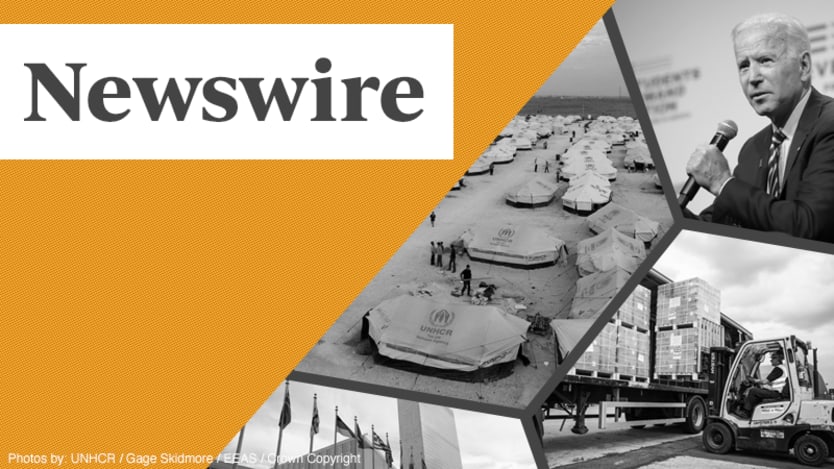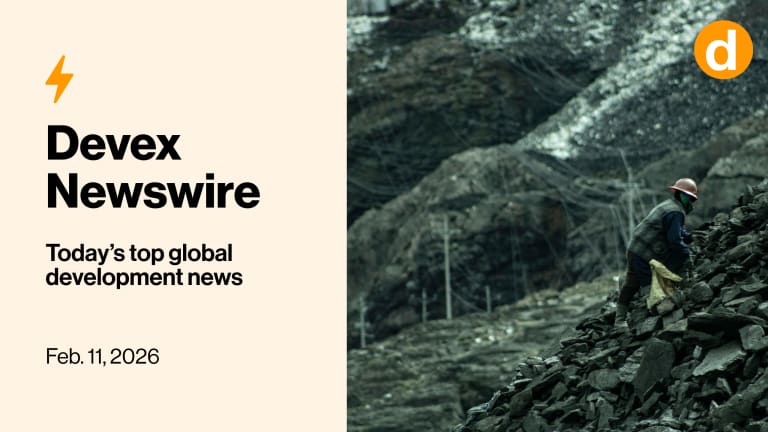
When it comes to drawing a line between legitimate health information and sexually explicit content, do social media companies really know it when they see it?
+ Join us on our second day of conversations about exactly what’s happening at COP 26. Discussions will start at 8 a.m. ET (1 p.m. CET). Save your spot.
Organizations working in sexual and reproductive health are frequently finding the information they share on social media flagged as explicit. That is a big problem at a time when more people are seeking health information online — particularly during a global pandemic, my colleague Rebecca Root reports.
This is a preview of Newswire
Sign up to this newsletter for an inside look at the biggest stories in global development, in your inbox daily.
“Facebook won’t let us advertise lubricants, talk about sexual health, or share 'feminist' accounts, setting dangerous limits on the work we do on Facebook — one of the important channels we rely on,” says Chris Purdy, CEO at the nonprofit DKT International.
Information about safe abortion is regularly labeled as explicit, Rebecca reports — even in countries where abortion is legal. But images of condoms, information about emergency contraception, and warnings against ineffective forms of birth control can also be censored — and replacing images with eggplant or banana emojis doesn’t work either.
Facebook’s Transparency Center says it makes allowances for nudity that serves “educational” and other purposes, but many organizations report lengthy back-and-forth appeals processes that are often less effective than using their networks to contact someone directly at the social media company.
And there is the question of power, and why it falls to the big tech companies to decide what information people should be able to access about their own health.
“At worst, I would say that it’s these larger platforms positioning themselves as paternalistic arbiters of morality,” says Daly Barnett of the nonprofit digital rights group Electronic Frontier Foundation.
Read: How social media censorship is impacting sexual health
ICYMI: Our Pro special report “A Globaldev Guide to New Social Media” explores how global development organizations are using TikTok, Clubhouse, and WhatsApp for outreach, communications, and fundraising.
Standing in the spotlight
In 2017, as multilateralists reeled from Donald Trump’s rise to power in Washington, the European Union committed €500 million to the United Nations under the Spotlight Initiative to prevent violence against women and girls. Now Spotlight is entering its “show-me phase,” Vince Chadwick reports.
The U.N. is ready to share its results — including helping to bring about new laws to help women and girls, and increasing conviction rates for perpetrators of violence — while Brussels considers the shape of a possible Spotlight 2.0.
Read: UN courts EU over Spotlight funding for women and girls
Data donors
Just how big is big data? According to this Devex analysis, donor funding for “data for development” comes to about $700 million per year. That’s about 0.3% of overall official development assistance spending. But donors take very different approaches to funding this work, and my colleague Miguel Tamonan has the breakdown.
Devex Pro: $700M per year goes to data for development. Who are the top donors?
+ Devex Pro subscribers can get to know who the top donors are across globaldev. Not a Pro subscriber yet? Sign up now and start your 15-day free trial.
Reality check
With the deluge of pledges and new initiatives pouring from COP 26 in the last 10 days, you could be forgiven for thinking the world has been saved in Glasgow. But the science tells a different story. According to a preliminary report from the U.N. Environment Programme, current pledges still put the world on track for 2.5 degrees Celsius of warming.
These final days of the negotiations in Glasgow are also expected to be the hardest. “The easy stuff happens early on,” says Clare Shakya of the International Institute for Environment and Development. “The final hours are where senior politicians have to resolve things,” she tells my colleague Will Worley.
A draft text of the climate deal has been released, but Will predicts it will be fought over by the 200 countries represented in Glasgow over the next few days, with talks scheduled to close Friday evening.
The text is wide ranging but of particular relevance to the development sector is the “serious concern that the current provision of climate finance for adaptation is insufficient to respond to worsening climate change impacts in developing country Parties,” and calls for higher-income nations to increase their adaptation funding.

Yesterday was also the thematic “gender” day in Glasgow — even though men are still overrepresented among climate delegates.
And yes, COP 26 has even seen a few dreaded “manels.”
Local heroes
“Many of our initial Grand Challenges grants went to researchers in high-income countries instead of directly to the scientists and institutions in the communities where the work is happening.”
— Trevor Mundel, president of global health, Gates FoundationThe Gates Foundation has announced $50 million in funding for locally led science — including malaria modeling in Africa and innovative ways to eradicate neglected tropical diseases — and Mundel says they’re putting a new focus on supporting local ecosystems.
In other news
The U.N. seeks the immediate release of 16 members of its local staff, along with their dependents, who have been detained by Ethiopian authorities. [New York Times]
The U.S. on Tuesday pledged to send police vehicles and protective gear equipment to Haiti to help address the Caribbean country’s gang crisis. [AP]
The world could face a 1- to 2-billion syringe shortage in 2022, according to WHO, and countries should plan ahead to avoid hoarding. [Reuters]
Sign up to Newswire for an inside look at the biggest stories in global development.








